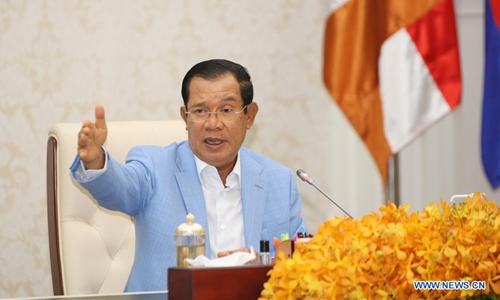HOME >> WORLD
Cambodian parliament adopts draft law on state of emergency amid COVID-19 pandemic
Source:Xinhua Published: 2020/4/10 13:59:33

Cambodian Prime Minister Samdech Techo Hun Sen speaks at a press conference on the latest situation of COVID-19 in Phnom Penh, Cambodia, April 7, 2020. Cambodian Prime Minister Samdech Techo Hun Sen said on Tuesday that mutual help between Cambodia and China in the time of COVID-19 pandemic has uplifted the bilateral relations to new heights. (Photo by Li Lay/Xinhua)
The National Assembly of Cambodia on Friday approved a draft law on the state of emergency amid the spread of COVID-19 pandemic.
One hundred and fifteen lawmakers, including Cambodian Prime Minister Samdech Techo Hun Sen, unanimously passed the draft bill.
In a written statement to the parliament, Hun Sen said the draft law was made based on the Article 22 of the Constitution, which states that "when the nation faces danger, the King shall make a proclamation to the people putting the country in a state of emergency after agreement with the Prime Minister and the Presidents of the National Assembly and the Senate."
"A state of emergency shall be declared when the nation faces dangers such as war or foreign invasion, public health concerns caused by pandemics, serious chaos to national security and public order, and severe calamity," the prime minister said.
He said the Article 22 of the Constitution has not stipulated measures to govern the country after a state of emergency is declared by the king, so the draft bill is indispensably essential to give the government powers to take all necessary measures to govern the country in a state of emergency.
"It aims to protect national security and public order, people's lives and health, properties and environment," Hun Sen said.
The draft bill comprises five chapters with 12 articles. It stated a number of measures including the prohibition or restriction of freedom of movement, right to freedom of gathering of people and work or occupation.
It also allowed the government to lock down public or private spaces in order to respond to any emergency.
The draft law also stated penalties for violators. Any intentional act of obstructing or hindering the operation of an emergency response is punishable by one to five years in prison and a fine of 250 to 1,250 U.S. dollars.
Acts of interruption in the event of a state of emergency are punishable by five to 10 years in prison if they result in public chaos or damage to national security.
The act of deliberately disregarding the measures laid down by the government is punishable by imprisonment from one month to one year and a fine of 25 to 250 U.S. dollars.
The draft law will need to be finally reviewed by the senate before being submitted to the king for promulgation.
It was made after the country has seen a spike in COVID-19 cases in recent weeks.
The Southeast Asian country has so far recorded a total of 119 confirmed cases of COVID-19, with 72 patients cured, according to a Ministry of Health's statement on Friday.
Posted in: ASIA-PACIFIC,WORLD FOCUS